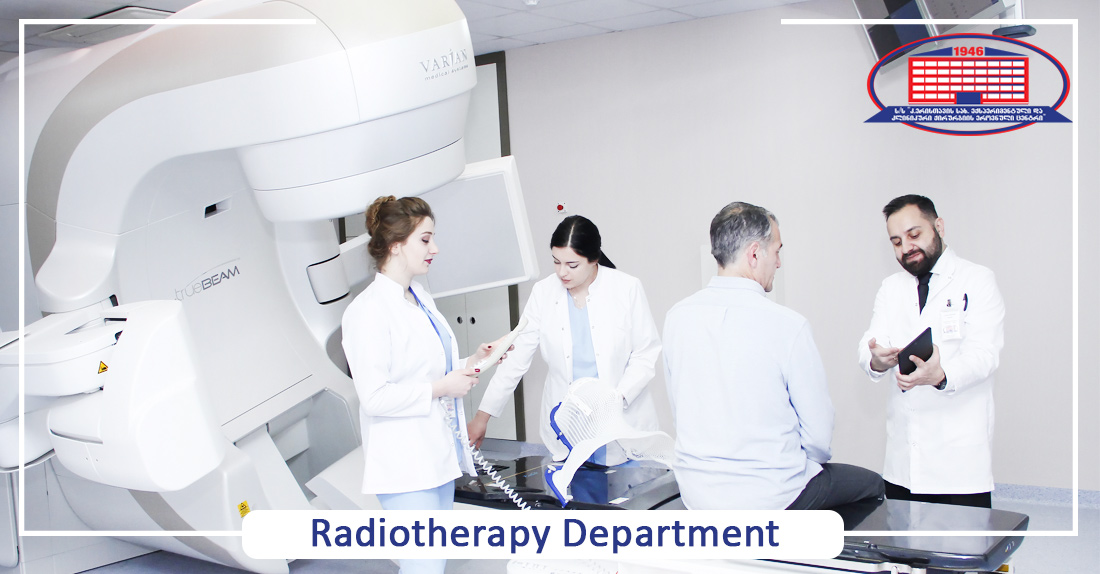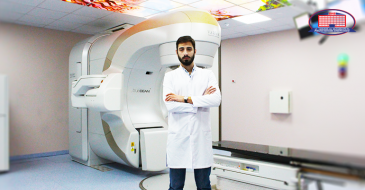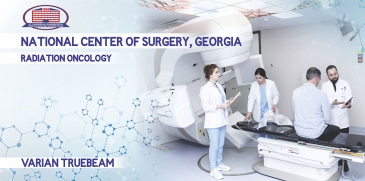
Cancer is a crucial challenge for modern medicine and radiation oncology is one of the effective forms of cancer management.
In the news, you will be informed about:
- Radiation oncology;
- Radiotherapy as an effective method;
- Linear accelerator;
- International support and foreign specialists;
- Brachytherapy;
- Positron-emission tomography.
February is a cancer month.
World celebrates World Cancer Day on the 4th of February.
This date aims to raise society's awareness about the importance of screening, symptoms, treatment, and prevention.
Oncology patients have successfully received radiotherapy at the Radiotherapy Department of National Center of Surgery for several years.
What is radiation oncology?
It’s a field of medicine that uses ionizing radiation to treat cancer.
Radiotherapy is conducted either alone or in combination with other treatment methods.
Radiation oncology is modern and one of the most effective methods for cancer management and post-treatment control imaging studies conducted at our department is proof of that.
One of the examples is a clinical case of 79 years old patient who had a small mass in the head for several years.
Other clinic removed mass in the forehead and morphological study detected T cell-rich B cell lymphoma.
Large ulceration developed at the site of the surgery in 2 months after the operation. Aforesaid ulceration spread throughout the whole forehead and both eye sockets. Ulceration caused pressure on optic nerves, sharp protrusion of eyeballs, and visual disorder. In particular, the patient was completely blind in one eye and had double vision in the other one. Also, it metastasized to the right parotid gland and inflammation spread to the right maxillary sinus.
Upon admission to National Center of Surgery patient suffered from unbearable pain in the areas damaged by cancer.
Along with the pain, the patient had the following symptoms:
- Severe general weakness;
- Severe visual impairment and double vision;
- Enlarged and painful right parotid gland.
Damaged areas were irradiated at National Center of Surgery.
Condition significantly improved during radiation therapy treatment. In particular:
- Unbearable plain was alleviated;
- Cancerous ulceration was reduced in half;
- Vision was restored in both eyes at the end of the treatment;
- Eyeballs returned to the standard anatomical position;
- Infiltration and ulceration in the forehead, eye socket, maxillary sinus were cleared up;
- Metastatic lesion in the right parotid gland disappeared.
Radiation therapy has been successfully delivered for up to 1000 patients since the opening of the department.
Oncologists who were educated in the leading universities of Europe and the U.S care for patient's heath; Each one of them is guided by the international guidelines.
Radiotherapy Department is a Georgian-American-Spanish project, in the framework of which citizens of Georgia receive American-European standard-level treatments in their homeland - radiation oncology is one of the priorities of National Center of Surgery.
As you might know, cancer treatment abroad is quite expensive. Thanks to this project, patients receive treatment with all existing modern methods of radiation oncology in their homeland, two or three times cheaper.
Why is the radiotherapy considered an effective method?
Radiotherapy is one of the main methods of treatment in oncology and is necessary in 70% of the cases.
Unlike chemotherapy, radiation therapy affects locally and is less characterized by systemic complications, side effects.
Unlike surgery, external radiation therapy is considered a non-invasive and organ-preserving treatment.
Radiation therapy can be delivered as:
Linear accelerator of the clinic
Patients receive individualized, evidence-based treatment using US company Varian’s modern and high technology, two clinically equivalent linear accelerators.
It’s worth mentioning that identical configuration ensures uninterrupted delivery of radiotherapy without any alterations to the plan or prolonged duration of the treatment.
Radiation therapy is delivered in high quality and in accordance with safety norms!
In the department, radiation oncology is used for treating the following organs and systems:
- Head and neck;
- Chest;
- Gastrointestinal tract;
- Genitourinary system;
- Hematologic cancer;
- Lungs;
- Central nervous system;
- Bone and soft tissue;
- Skin and so on.
In the department, chemotherapy unit successfully provides treatment based on the latest international protocols and guidelines.
Radiation oncology and international support
Tumor board (a group of oncologists) reviews each case and plans treatment tactics.
Invited experts from the U.S and Spain participate in the treatment; following people review all clinical cases and manage it together with Georgian colleagues: professor of Radiation Oncology Department, Emory University, leading specialist at Spain Genesis Care’s Multidisciplinary Institution of Oncology and member of Public Relations Committee of ESTRO International Radiation Oncologists, associate professor of Murcia University.
Renowned experts in oncology often visit the department and provide the latest information in various fields, for example, full professor of radiology and nuclear medicine, director of Nuclear Medicine Department of Grady Hospital, Emory University, Raghuveer Halkar made a presentation about the role of positron-emission tomography in modern oncology.
Also, the department hosted a monthly meeting organized by the Association of Young Oncologists.
Professors of Emory University, Murcia University, Istanbul University Clinic presented the topics on oncology at the fifth international conference of the clinic.
Moreover, Radiotherapy Department permanently hosts representatives of clinics located in Georgia, as well as abroad. The campaign aims to inform colleagues about advanced principles in the management of oncology.
News in the department – Brachytherapy and positron-emission tomography
The department has added a new radiation oncology service brachytherapy that is delivered through company Elekta’s modern, multifunctional applicators on high-dose device Flexitron-HDR with a sophisticated and accurate 3D system of planning.
In this method of the treatment, radiation source is placed directly in the organ damaged by cancer, therefore, it affects the whole mass and accurately delivers radiation.
It’s an invasive method of irradiation during which, other healthy organs and structures are maximally protected.
According to statistics of National Cancer Database and EMBRACE, this method increases local control and survival rate by 29% in the treatment of gynecologic cancers.
The main advantages of this method are:
- Rapid effect of high-dose radiation on cancer cells;
- High biological effect;
- Possibility of complete control of cancer;
- Minimal radiation toxicity to surrounding healthy tissues;
- Overall, a minimum number of procedures.
Up to 50 interventions were successfully conducted since this method was established at National Center of Surgery
It’s worth mentioning that several weeks ago Prostate HDR brachytherapy in real-time mode was delivered at National Center of Surgery for the first time in the region. It was performed on a 65 years old patient with the diagnosis of high-risk prostate adenocarcinoma.
Complex treatment was conducted – hormone therapy and external radiation therapy after which brachytherapy was ordered.
Prostate HDR brachytherapy means high-dose rate irradiation and in this specific case, an additional dose of radiation was delivered on a damaged prostate gland.
The procedure progressed without any complications and the patient has already returned to the usual rhythm of life.
Oncology patients very soon will be able to utilize an uncontested method in diagnosing cancer, such crucial method in a nuclear medicine that is called positron-emission tomography (PET/CT).
This method enables nuclear medicine specialist to:
- Detect the smallest cancer;
- Define treatment tactics;
- Determine the expansion grade of cancer;
- Differentiate between benign and malignant tumors;
- Evaluate the effectiveness of chemotherapy and radiation therapy;
- Identify the primary source of the metastasis.
It studies the whole human body and presents a functional method of studies because it shows metabolic changes.
It’s worth mentioning that the department will be equipped with the first digital positron-emission tomography scanner (PET/CT) in the Eastern Europe and Post-Soviet Union sphere and the space designed for it is under construction even at this very moment.
Radiotherapy Department of National Center of Surgery offers patients complete treatment and diagnostic spectrum, comfortable and pleasant environment.
Many oncology patients have already received high-quality medical care and returned to their usual rhythm of life with an improved health condition.
Citizens of Georgia, as well as foreign patients, receive treatment at the department.
Wish you health!
What are patients interested in
Chemotherapy
Qauestion:: Hello, My mother received several courses of chemotherapy, because of metastatic involvement of bone and liver. During that time platelet count significantly decreased and only presented with small skin hemorrhages. In chemotherapy, platelet count sometimes increases or decreases, she simultaneously takes Revolade (50mg) on a daily basis and underwent platelet transfusion several times that had an only short-term effect. Is it possible to find another solution for the mentioned problem at your clinic? Thanks in advance










